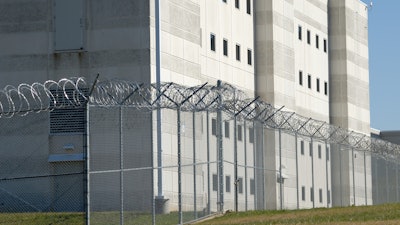
LAS VEGAS (AP) — A federal appeals court said Friday the nation’s largest private prison corporation can be held liable for negligence by a man who spent almost a year in solitary confinement at a southern Nevada facility without ever seeing a judge on marijuana-related charges.
The 9th U.S. Court of Appeals in San Francisco said a jury can hear Rudy Rivera’s lawsuit claiming that CoreCivic Inc. employees failed to tell the U.S. Marshals Service while Rivera languished in custody from November 2015 to October 2016 at the Nevada Southern Detention Center outside Las Vegas.
“A reasonable jury could find that CoreCivic caused plaintiff’s prolonged detention by failing to notify the Marshals of his continued detention without a hearing and by discouraging and preventing him from seeking outside help,” a panel of three judges said.
A CoreCivic official said the company is confident a jury will find CoreCivic wasn't responsible for Rivera's prolonged detention without a court appearance.
“CoreCivic does not have legal custody of detainees and is not responsible for the arraignment or tracking the arraignment of detainees,” Ryan Gustin, company public affairs manager, said in a statement.
Rivera had “numerous resources at his disposal to challenge his legal custody,” the statement said, including telephones that he used to call family members, mail, attorney visits and legal reference materials. Rivera also "never submitted any verbal or written grievance about this issue,” Gustin said.
The resurrected case now returns to U.S. District Court in Las Vegas, where a judge in 2017 dismissed it saying that because Rivera was in U.S. Marshals Service custody, the company wasn't responsible for Rivera’s 355-day detention.
“They were basically taking the position that, ‘Eh, what were we supposed to do? Not our fault,’” said Rivera’s attorney, Mitchell Bisson.
He said damages for negligence, intentional infliction emotional distress and civil and constitutional rights violations could amount to much more than $1 million.
Rivera, 42, lives in Stockton, California. He said the ruling gave him “reason to hope the broken system we are in now will be torn down and that no one else will have to go through what I did.”
“The year I spent in there trying to plead my way out was the hardest time of my life, and I’m still struggling with the effects it had on me and my family,” he said in an email through his attorney. “I hope CoreCivic now realizes that they can’t just point their finger in the other direction and avoid the consequences of their actions and inactions.”
Rivera was arrested in California in October 2015 and appeared before a federal judge there before he was transferred in custody to Nevada on an indictment charging him with marijuana-related offenses.
The charges were eventually dropped, after a deputy federal public defender, reached by letter, informed a judge who ordered Rivera brought to court the next business day.
The judge “declared Rivera's prolonged detention ‘extreme’ and ‘egregious’ and ordered his immediate release,” the appeals court order noted.
Rivera had been separated from other detainees and inmates at the 1,000-bed prison due to a previous gang affiliation, according to court documents. Jailers were nearly the only people he encountered.
“During his detention, Rivera repeatedly told CoreCivic employees ... that he had not been to court and did not have (a lawyer),” the judges said in Friday’s ruling. “But CoreCivic employees neither informed the Marshals of Rivera’s plight nor took any other steps to remedy the situation.”
Rivera testified he was told to “just sit there and wait.”
The court noted the Marshals Service contracts with state, local and private facilities to house about 85% of the 160,000 people in federal custody nationwide, and is the primary customer at eight of CoreCivic’s 47 facilities around the country.
CoreCivic, which is publicly traded and was formerly known as Corrections Corporation of America, secured its first federal contract in 1983. Nearly $400 million worth of U.S. Marshals Service business accounted for 21% of company revenues in 2020, according to the company’s annual Securities and Exchange Commission report.
The appellate judges said the Marshals Service is the primary customer at the 1,000-bed prison. The medium-security facility opened in 2010, about 60 miles (96.56 kilometers) west of Las Vegas.






















